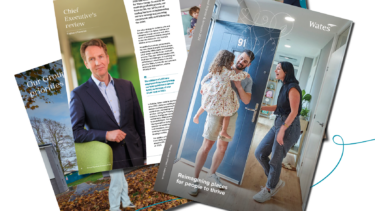When Stuart Paver and his colleagues saw the horrifying scenes of the invasion of Ukraine unfolding, they felt compelled to do something. As the managing director and second-generation member of York-based Pavers Shoes, giving a financial donation wasn’t enough. Instead, they flew to Romania, rented a minibus, and drove to Ukraine. After a precarious drive to Odessa, they visited a hospital and spoke to doctors about what medical supplies were needed. Armed with a list of medicines and equipment that was desperately needed, they then drove back across the border to buy these before returning to Odessa.
Stuart and his team have so far made four trips into Ukraine and are planning more. Applying their understanding of how supply chains work, they have been able to source and deliver over £263,000 of medical and humanitarian aid to Ukraine, including tourniquets to treat wounds, insulin, water purification tablets, and yeast for bread-making.
That is the spirit of the family business, which we celebrate during this week. As chairman of the Institute for Family Business, I am incredibly proud of the initiative that our members, like Paver Shoes, have taken in responding to the war in Ukraine.
More than 85 per cent of UK businesses are family-owned. That’s around five million family businesses. They employ about 14 million people and generate £575 billion in gross value added to GDP in the UK. They come in all shapes and sizes and can be found in every industry, every nation and community in the UK.
And yet most people have no idea how vital they are to our economy and our communities.
That is why we celebrate Family Business Week to draw attention to the massive role that family businesses play in the UK and to celebrate their successes.
Companies like Glasgow-based GAP Group are helping tackle the greatest challenge of our time — addressing climate change and reaching ambitious net-zero targets. A plant hire specialist, it has developed new eco-products, such as a hybrid lighting tower that provides up to 86 per cent reduction in fuel costs and a 47 per cent reduction in carbon emissions.
GAP Group, along with other family businesses like Shepherd Group, which owns the modular building Portakabin brand, are partnering with local schools to provide mentorship to students in deprived areas of the UK. This hands-on community work helps raise aspirations, develops communications skills, and provides career direction.
During the pandemic, we heard many other stories of the key role our family business members played in supporting local charities, vulnerable people and the wider economy. Thousands of family firms used their savings to both stay afloat and support local communities as the country dealt with unprecedented Covid restrictions.
They have continued to face big challenges. This year crippling inflation and record-breaking energy prices have taken their toll. Four in five family businesses have told us that they are less confident going into this winter than they were at the height of the pandemic.
The government has to act to provide the environment in which they can thrive. Last week’s autumn statement represented a make-or-break moment.
The results were mixed. Family businesses had been desperate for a stable government that can provide a long-term plan and clear economic direction following the extended period of instability. This environment – teamed with high operating costs from record-level energy prices and rising inflation – has meant family firms eager to begin investing as part of their recovery following the pandemic have continued to hold back until they feel sure their day-to-day operations are secure.
Thursday’s announcement from the chancellor answered the first of two issues by making clear how the government plans to work with the Bank of England to bring inflation down to more appropriate levels for business in the short term. This level of stability was warmly welcomed and is key to business confidence. As was the chancellor’s decision to keep an eye on the long term by not slashing infrastructure investment and R&D spending.
However, the chancellor could have done more, not least to incentivise investment and address the long-term issue of business rates. For small companies the increases to the amount they’ll pay through dividends and capital gains taxes will be especially hard, having received limited support during the last two years.
They now face a cocktail of tax rises once they get through a difficult winter, at the same time as they’ll see rising business rates and energy costs.
Family-run care homes are concerned about affording heating for their residents. Traditional bakeries – the fabric of the UK high street – are wondering how to afford rising business rates. Construction companies are searching for financial incentives to invest in green technologies vital to achieving net zero.
Family businesses are key to the future prosperity of Britain. Their unique ownership model sustains and promotes long-standing stewardship, balancing the management of resources in the short, medium and long term. I hope the government recognises that for all of us to tackle these challenges together, they must be clear in providing businesses with the tools to do so.
Sir James Wates CBE is the chairman of Wates Group and the Institute for Family Business






